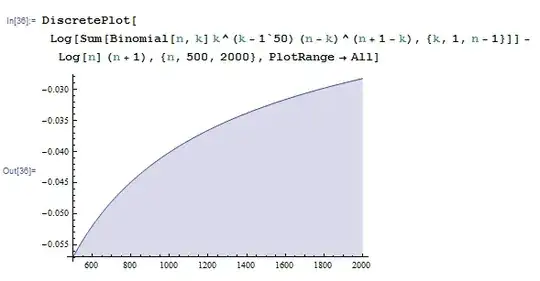Here is my version (up to computaitonal errors). Information on Lambert's W function $W(z)$ can be found in (Corless, Gonnet, Hare, Jeffrey, & Knuth, "On the Lambert W Function"). Begin with
\begin{equation*}
-W(-z) = \sum_{n=1}^\infty \frac{n^{n-1}}{n!}\,z^n
\tag{1}
\end{equation*}
The radius of covergence is $e^{-1}$. It is analytic beyond the circle
$|z|=e^{-1}$ everywhere except the point $e^{-1}$, where it has a
quadratic branch point. We may expand at that point:
$$
-W(-z) = 1 - \sqrt{2}(1-ez)^{1/2} + \frac{2}{3}(1-ez)
-\frac{11\sqrt{2}}{36}(1-ez)^{3/2} +\dots
$$
as $z \to e^{-1}$ from the left (that is, $z$ approaches from
inside the circle of convergence).
From (1), differentiate then multiply by $z$ to get
$\sum n^{n} z^n/n!$. Again, differentiate then multiply by $z$ to get
$\sum n^{n+1} z^n/n!$. The result is
\begin{equation*}
\frac{-W(-z)}{\big(1+W(-z)\big)^3}
=\sum_{n=0}^\infty \frac{n^{n+1}}{n!}z^n
\tag{2}\end{equation*}
Multiply (1) and (2) to get
\begin{align*}
h(z) &:= \frac{W(-z)^2}{\big(1+W(-z)\big)^3} =
\sum_{n=1}^\infty \left(\sum_{k=1}^n \frac{k^{k-1}}{k!}\;
\frac{(n-k)^{n-k+1}}{(n-k)!}\right)z^n
\\ &=
\sum_{n=1}^\infty\left(\frac{1}{n!}
\sum_{k=1}^n \binom{n}{k} k^{k-1}(n-k)^{n-k+1}\right)z^n
=: \sum_{n=1}^\infty c_n z^n
\tag{3}\end{align*}
The singularity for $h(z)$ nearest the origin is again at $z=e^{-1}$,
and the expansion there is
\begin{align*}
h(z) = \frac{1}{2\sqrt{2}}(1-ez)^{-3/2}
&-\frac{1}{2}(1-ez)^{-1}
-\frac{1}{8\sqrt{2}}(1-ez)^{-1/2}
\\ &
+\frac{149}{540}
-\frac{767}{8640\sqrt{2}}(1-ez)^{1/2} +O\big((1-ez)\big)
\end{align*}
as $z \to e^{-1}$ from the left.
Now, we use a theorem of Szegö (or Darboux?) to deduce the asymptotics
of the coefficents of power series $h(z)$.
(Szegö, Orthogonal Polynomials, Theorem 8.4;
quoted in Wilf, generatingfunctionology, 1st edition,
Theorem 5.3.2). We have an asymptotic series, as $n \to \infty$
\begin{align*}
c_n &\approx e^n\Bigg[\frac{1}{2\sqrt{2}}\binom{n+1/2}{n}
-\frac{1}{2}\binom{n}{n}
-\frac{1}{8\sqrt{2}}\binom{n-1/2}{n}
\\ & \qquad\qquad
+\frac{149}{540}\binom{n-1}{n}
-\frac{767}{8640\sqrt{2}}\binom{n-3/2}{n} +\dots
\Bigg]&
\\ c_n &= e^n
\Bigg[\frac{1}{2\sqrt{2}}\left(\frac{2}{\sqrt{\pi}}n^{1/2}+
\frac{3}{4\sqrt{\pi}}n^{-1/2}
-\frac{7}{64\sqrt{\pi}}n^{-3/2} +O\left(n^{-5/2}\right)\right)
-\frac{1}{2}\big(1\big)
\\ & \qquad\qquad
-\frac{1}{8\sqrt{2}}\left(\frac{1}{\sqrt{\pi}}n^{-1/2}
-\frac{1}{8\sqrt{\pi}} n^{-3/2}+O\left(n^{-5/2}\right)\right)
+\frac{149}{540}\big(0\big)
\\ & \qquad\qquad
-\frac{767}{8640\sqrt{2}}\left(-\frac{1}{2\sqrt{\pi}}n^{-3/2}
+O\left(n^{-5/2}\right)\right)
+O\left(n^{-5/2}\right)\Bigg]
\\ &=
e^n\left[\frac{1}{\sqrt{2\pi}}n^{1/2} -\frac{1}{2}
+\frac{1}{4\sqrt{2\pi}} n^{-1/2}
+\frac{23}{4320\sqrt{2\pi}}n^{-3/2}
+O\left(n^{-5/2}\right)\right]
\tag{4}\end{align*}
Now from (3) we see that the required expression is $n! c_n$.
So we need the asymptotic expression
\begin{align*}
n! &=
e^{-n} n^n \sqrt{2\pi}\left(
n^{1/2}+\frac{1}{12}n^{-1/2}+\frac{1}{288}n^{-3/2}
+O\left(n^{-5/2}\right)
\right)
\tag{5}\end{align*}
Multiply (4) and (5) to get
\begin{align*}
&\sum_{k=1}^n \binom{n}{k} k^{k-1}(n-k)^{n-k+1} = n!c_n
\\ &\qquad =
n^n\Bigg( n
-\frac{\sqrt{2\pi}}{2} n^{1/2} + \frac{1}{3}
-\frac{\sqrt{2\pi}}{24} n^{-1/2}
+\frac{4}{135}n^{-1}
-\frac{\sqrt{2\pi}}{576}n^{-3/2}
+O\left(n^{-2}\right)\Bigg)
\end{align*}
